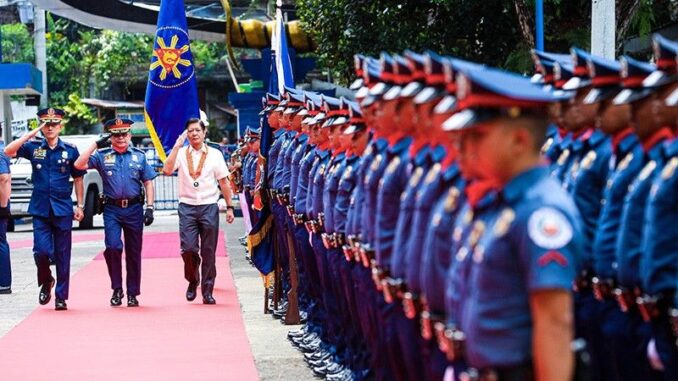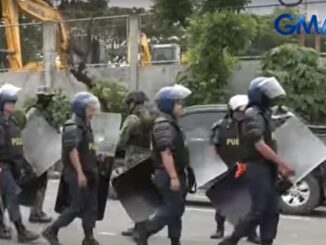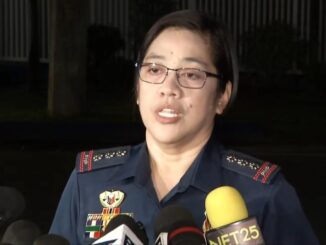
MANILA, Philippines — While the president’s allies in Congress are closing ranks to expose drug war abuses, the Philippine National Police has continued to deny the Commission on Human Rights access to crucial police records related to Duterte’s brutal drug campaign.
The police have given various reasons to justify their continued stonewalling of the human rights commission. Some, including the PNP top brass, have invoked the exemptions to Freedom of Information requests as outlined in the Duterte-era Executive Order (EO) No. 2, CHR Chairperson Richard Palpal-latoc said on Tuesday, October 29.
“Some simply refuse outright. Others cite directives from their officials,” the CHR chairperson said in mixed Filipino and English in an interview with “Radyo DZBB.”
It is the “reality on the ground” that some police files on drug war cases remain out of the CHR’s reach — even in the present Marcos administration.
“We experience this on the ground with our investigators. During the height of police operations against illegal drugs, whenever there were deaths, our investigators would immediately go to the area of the incident,” Palpal-latoc said.
“One of our sources of evidence is the police report. However, there are instances where police stations refuse to provide documents,” he added.
Flagging PNP’s attention. The CHR chairperson said he previously raised the denied requests for police records during the House of Representatives’ investigation into former President Rodrigo Duterte’s war on drugs, where he sat across the PNP’s human rights affairs office.
Palpal-latoc did not specify which House hearing he was referring to, but the lower chamber has so far held two kinds of drug war inquiries in recent months: first, through the House human rights panel in May, and second, through the current House quad-committee.
“After that, we reached out to the PNP chief [Gen. Rommel Marbil]” Palpal-latoc said. “However, their response remained the same. They are using EO 2 as their reason for not providing us with documents.”
Exemptions to FOI order. EO 2, signed by Duterte in 2016, mandates full public disclosure of all government transactions and information in the executive branch, subject to certain limitations.
Some of the exceptions to full public disclosure include information that could compromise national security and information concerning law enforcement and the protection of public and personal safety.
But the CHR, being an independent body, has the power to request police records from the PNP, Palpal-latoc said.
“Mandato ng commission yun. Kaya lang sa pamamagitan ng isang memorandum o direktiba, nabaliwala ang mandato (That is the mandate of the commission. However, through a memorandum or directive, that mandate has been rendered ineffective),” he added.
No closure yet on drug war
With the commission “exploring all possible ways” to get the information they need, Palpal-latoc said they have reconstituted a task force to study cases of extrajudicial killings during the drug war and identify incidents of police misconduct.
“Wala pa talagang closure saamin. Wala pang pagtukoy kung sino ang may pananagutan (There is still no closure for us. There has been no identification of who is responsible),” he said.
The CHR chairperson, who was present during yesterday’s (October 28)’s Senate inquiry into Duterte’s drug war, hopes the PNP can still revise its policy.
“We also heard from Sen. Bato yesterday that if you talk to the chief PNP, the process will be easy if he agrees. We hope that things will change,” he said. “However, if they don’t, we are studying what else we can do to obtain the documents.”
RELATED: A year into presidency, Marcos quietly keeps Duterte’s drug war going | No ICC return despite bombshell drug war accusations
Victims of the drug war have, in their communications with the International Criminal Court (ICC), pointed to inaction from local courts and the police’s unwillingness to investigate killings as roadblocks to achieving justice for their slain relatives.
Families of those killed have repeatedly said that the ICC remains the only avenue for a genuine and impartial investigation into the alleged crimes against humanity committed during Duterte’s war on drugs.
CHR support for Quad Comm probe
To achieve “tangible progress” on the government’s investigation of drug war cases, the CHR has said it is willing to cooperate with the House Quad Committee’s probe into the killings during Duterte’s drug war.
“Given the considerable challenges the CHR faced during the past administration, we are encouraged that the current socio-political climate offers a more conducive environment for the resolution of these cases,” the CHR said in a statement.
“We stand ready to aid the Quad Committee in their undertaking by sharing our investigation reports and findings in the pursuit of truth and accountability,” it added.
The previous House Quad Comm hearings have seen past and present members of the police force turn the tables on their former principals, with several accusing Duterte and senators Bong Go and Ronald dela Rosa of facilitating or tolerating a nationwide drug reward and quota system.
The Senate’s Blue Ribbon committee launched a counterpart investigation into the drug war yesterday, but critics say the hearing spiraled out of control as senators struggled to rein in the former president, who deflected accountability questions with his familiar drug war rhetoric.





Be the first to comment